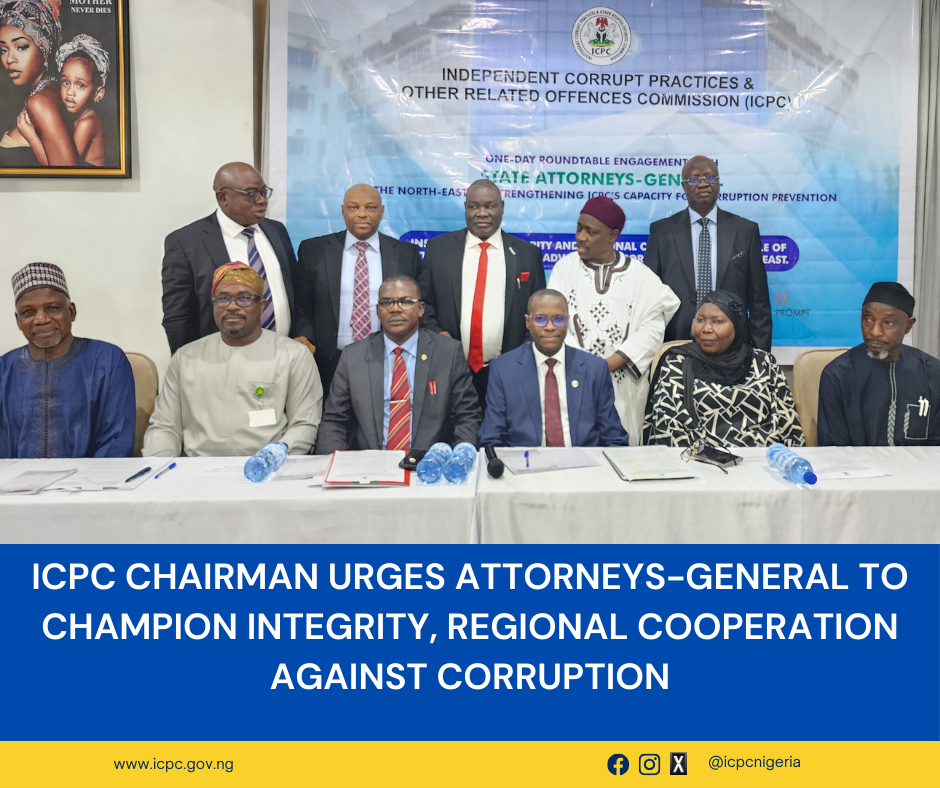The Chairman of the Independent Corrupt Practices and Other Related Offences Commission (ICPC), Dr. Musa Adamu Aliyu, SAN, has called on State Attorneys-General in the North-East to strengthen institutional integrity and deepen regional cooperation in the fight against corruption.
Dr. Aliyu made the call in Maiduguri, Borno State, during the ICPC Roundtable Engagement with State Attorneys-General in the North-East Zone, themed “Institutional Integrity and Regional Cooperation: The Role of Attorneys-General in Advancing a Corruption-Free North-East.”
In his welcome address, the ICPC Chairman emphasized that corruption undermines economies, fuels insecurity, and erodes public trust, stressing that only a united approach between Federal and State governments could effectively address the scourge.
“Punishment alone is not enough. We must combine approaches: recover stolen assets, restore justice to victims, strengthen our systems, and above all, work together across institutions and across regions,” Dr. Aliyu stated.
The ICPC boss recalled that the initiative began on September 3, 2024, in Abuja with the inaugural roundtable, attended by 34 out of 36 Attorneys-General. Engagements have since been held in Kano, Asaba, Ilorin, and Enugu, before reaching Maiduguri for the North-East session.
He further acknowledged the support of the National Assembly Committees on Anti-Corruption and commended the presence of eminent jurists, including the Chief Judge of Borno State, Hon. Justice Kashim Zannah, and Professor Auwalu Hamisu Yadudu, describing them as “towering figures of law and justice.”
Delivering a keynote address, Senator Kaka Shehu Lawan, SAN, underscored the necessity of collaboration between State Attorneys-General and the ICPC, stressing that the region, despite its vast potential, faces compounded challenges from insurgency, humanitarian crises, and slow recovery, making every naira lost to corruption a major setback.
Senator Lawan added that State Attorneys-General, as custodians of state laws, and the ICPC, with its federal investigative and preventive mandate, play complementary roles, describing their partnership as a “strategic imperative” that guarantees faster investigations, stronger prosecutions, and more effective preventive measures.
In a goodwill message, Hon. Justice Kashim Zannah, represented by Hon. Justice Aisha Kumalia, commended the engagement, noting the synergy between the Commission and State Attorneys-General, describing it as “vital for effective prosecution of corruption cases and national development”.
He further acknowledged the achievements of both the ICPC and EFCC, citing reduced complaints of fraud and successful prosecutions as progress in building a more secure and accountable society.
At the end of the engagement, a communiqué was developed and read, reaffirming the participants’ commitment to anti-corruption in the North-East and the resolve to formalize the partnership through a Memorandum of Understanding (MoU), strengthening of preventive mechanisms such as procurement monitoring, and the establishment of a joint intelligence-sharing and case management framework to enhance investigations and prosecutions.
The communiqué also relayed the importance of capacity building for prosecutors and investigators, particularly in modern tools such as data-driven risk management, cybersecurity, and forensic technology.
It further highlighted the need for active public participation, using community leaders, civil society, and the media to communicate anti-corruption messages in local languages at the grassroots level.
In the end, the agreement reached is an indication that the North-East states would take the lead in ensuring accountability at both state and local government levels and thereby sustain the collaboration between Federal and State institutions, with a view not to just strengthen governance in the zone but also serve as a model for advancing integrity and accountability across the country.
The roundtable brought together Attorneys-General from Borno, Adamawa, Bauchi, Gombe, Taraba, and Yobe States, alongside stakeholders from the judiciary, legislature, and academia.


